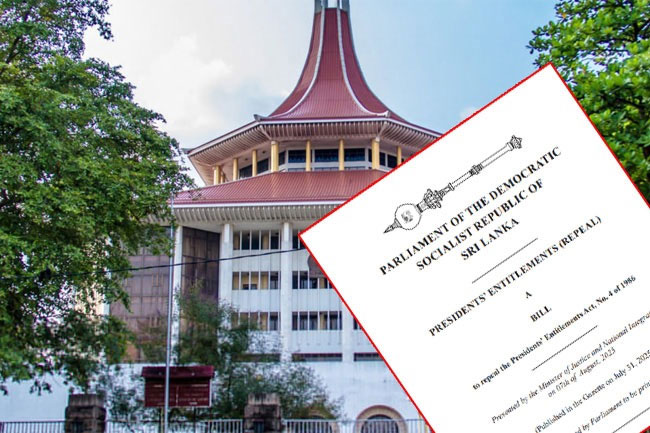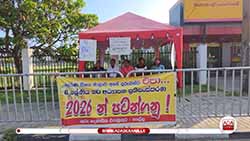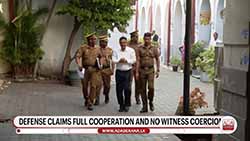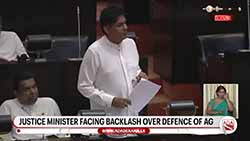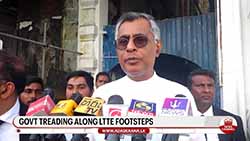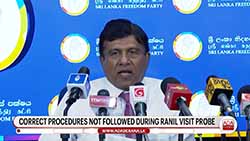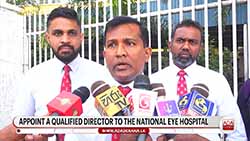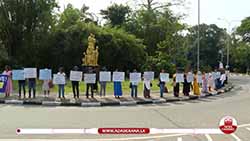SC concludes hearing of petitions against bill to revoke privileges of former Presidents
August 25, 2025 04:01 pm
The Supreme Court today (25) announced that it will submit its confidential determination on the constitutionality of the bill presented by the government to remove privileges of retired presidents to the Speaker of House.
After an extensive hearing, a three-judge bench comprising Chief Justice Preethi Padman Surasena and Justices Achala Wengappuli, and Sampath Abeykoon issued the order concluding the hearing of petitions filed against the Presidents’ Entitlements (Repeal) Bill.
At the commencement of today’s hearing, President’s Counsel Ali Sabry, appearing on behalf of former Chief of Staff of the Navy S.M. Wijewickrama, who had filed a petition, argued before court that, under Section 3 of the Presidential Entitlements Act No. 4 of 1986, retired presidents or their widows are entitled to housing, pensions, staff facilities, and transportation.
The Act further states that if a residence is not provided, one-third of the pension amount must be paid by the government as a housing allowance.
Ali Sabry further noted that Articles 36(2) and 36(4) of the Constitution safeguard the rights and privileges of former presidents.
He emphasized that former presidents or their widows are constitutionally entitled to any benefits decided by Parliament, and while these benefits can be increased, they cannot be reduced, as clearly stated in the Constitution.
Sabry argued:
“Your Lordships... The privileges of a president are tied to the Constitution. Therefore, any amendment requires not only a special majority in Parliament but also approval from the people through a referendum, as previously established by the Supreme Court. For instance, in 2015, then-President Maithripala Sirisena voluntarily attempted to reduce certain powers through the 19th Amendment. However, the Court ruled that such powers could only be removed with public approval, since those powers belong not to Maithripala Sirisena personally, but to the Executive Presidency itself.”
He further noted:
“After former U.S. President Barack Obama retired, he requested to waive his pension, but the U.S. Congress rejected it, stating that the privileges are not for the person, but for the dignity of the office. Hence, they cannot be waived.”
Sabry argued that such privileges ensure individuals of high calibre are encouraged to accept high office, and are especially important for ensuring the post-retirement security of presidents who made critical decisions while in office—such as during the final stages of the war in 2009.
“At that time, immense international pressure, especially from Western countries like France and the United Kingdom, was exerted on the Sri Lankan President to stop the war. Yet, the President resisted this and made a very dangerous but bold decision to continue. This is why the Presidential Entitlements Act remains important even today,” he said.
Sabry concluded that since Executive Presidents are elected by the people, Parliament alone cannot remove their post-retirement privileges without a referendum.
Attorney Ashok Baran, appearing for Sri Lanka Podujana Peramuna Administrative Secretary Renuka Perera, told the bench that Parliament attempting to curtail presidential powers contradicts the doctrine of separation of powers enshrined in the Constitution.
He argued that the proposed bill undermines constitutional guarantees afforded to former presidents and thus cannot proceed without public approval.
President’s Counsel Eraj de Silva, representing another party, also emphasized that provisions in the proposed bill violate the principle of separation of powers and constitute an attempt by the legislature to undermine the executive, thereby violating people’s sovereignty.
He warned that this amounts to a serious constitutional breach, as it effectively suspends Article 36, removing the president’s independence and affecting national sovereignty.
Attorney Saman Galappaththi, appearing for former President Mahinda Rajapaksa’s media spokesperson Manoj Gamage and Professor Mahinda Pathirana, argued that the privileges of former presidents were granted by the people, and therefore, any reduction must go to a referendum.
Solicitor General Viraj Dayaratne, appearing for the government, responded by referencing the 1970 parliamentary election, where Sirimavo Bandaranaike’s government won with a two-thirds majority and introduced the 1972 Constitution, transitioning Sri Lanka into a republic. He noted that J.R. Jayewardene, the first Executive President, was not elected by the public, but appointed through a constitutional amendment.
In 1977, Jayewardene campaigned promising a new Constitution with an Executive Presidency, which was later introduced as the 1978 Constitution following a decisive election victory.
He stated:
“The current government too made a campaign promise to remove the privileges of former presidents. This bill is a step in fulfilling that promise. This is not a constitutional amendment, but simply a repeal of the Presidential Entitlements Act No. 4 of 1986. It does not affect presidential pensions or any fundamental rights enshrined in the Constitution.”
Therefore, he argued, there is no requirement for a referendum, and the bill can be passed with a simple majority in Parliament.
He added:
“This is a policy decision by the government. The bill does not touch the constitutional pension rights of former presidents. Repealing the 1986 Act is within Parliament’s power and does not violate any constitutional principles.”
After reviewing submissions from both sides, the Supreme Court bench directed the parties to submit any written submissions by noon on Thursday (28), after which the Court will submit its confidential ruling to the Speaker of House.



